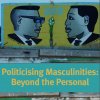Miscellaneous
What image pops up when you hear the term ''feminist''? Some might imagine unshaven legs and armpits, short hair and a shorter temper. Others might envisage a middle-class humanities academic - perfect prey for ''chardonnay socialist'' gibes. If you imagined both of these, well done. I have hairy pins, I'm bald, I have a background in the liberal arts - and I'm a feminist.
It’s a weeknight after a particularly tough day at work. You’ve just put the kids to bed. You can’t stop thinking about work, the problems waiting for you there tomorrow and it’s getting you down. You don’t feel like talking about it, especially not with your partner. You just want to be left alone to mull things over. You’re ready for a beer and the couch.
Your partner always knows when some thing’s up and tonight is no exception. She sits beside you on the couch and asks ”Are you ok? You haven’t said much all night.” You reply with a curt, “I’m fine.” And you turn back to the TV hoping she will change the subject. Your partner is offended now and she gets up and leaves the room.
Does this sound familiar? It’s a common scenario that many men could avoid if they developed their emotional intelligence.
Gender equality has long been synonymous with women and their struggle for economic independence, equal pay, and equal power. It has also been a key principle in eliminating oppression and violence.
However, gender equality is about both men and women. Men spend less time together with their own children, are more prone to accidents, are over-represented in crime statistics, and drop out more often from upper secondary education. These examples indicate that men would have much to gain from true gender equality. Men are under-represented in the teaching professions in preschools and schools, in nursing and children's social services. At the same time, men still sit in the majority of positions of power in society and they still make more money than women. It is mainly men who are the perpetrators of domestic violence.
In recent years there have been positive changes in the role of males in society. It has been almost 20 years since the Committee on Male Roles in 1991 presented its recommendations. The Committee on Male Roles pointed out the following goals: the reallocation of power between women and men, more time for fathers to care for their own children both before and after a family breakup, reduced gender differences in choice of education and training and the prevention of men's violence against women; all of these were to be central goals for the future work towards gender equality. In several areas the development in the period has been positive. In particular, there is reason to look at the development in the home, and the increased contact between fathers and their children. In other areas, however, the development has been stagnant or negative. While women have entered previous male arenas in the working life, there has not been any increase in employment of men in the health and care giving sectors. In the education sector men constitute a smaller group today than 15 years ago. Consequently, there is reason to reiterate the goals stated by the committee.
I’ve been working to end men’s violence against women for almost 20 years. And I am doing this work largely because of the inspiration, teachings and welcome of powerful, smart, feminist women. We men (myself included) owe it to these women, and to ourselves, to practice true accountability.
Produced by the Institute of Development Studies (IDS), this report summarises and draws inspiration from the Politicising Masculinities symposium, which took place on 15-18 October 2007 in Dakar, Senegal. The report reflects on four key areas of discussion that took place at the symposium: new ways of theorising; male bodies and sexualities; shaping policies and transforming institutions; and mobilisation, activism and movement-building.
